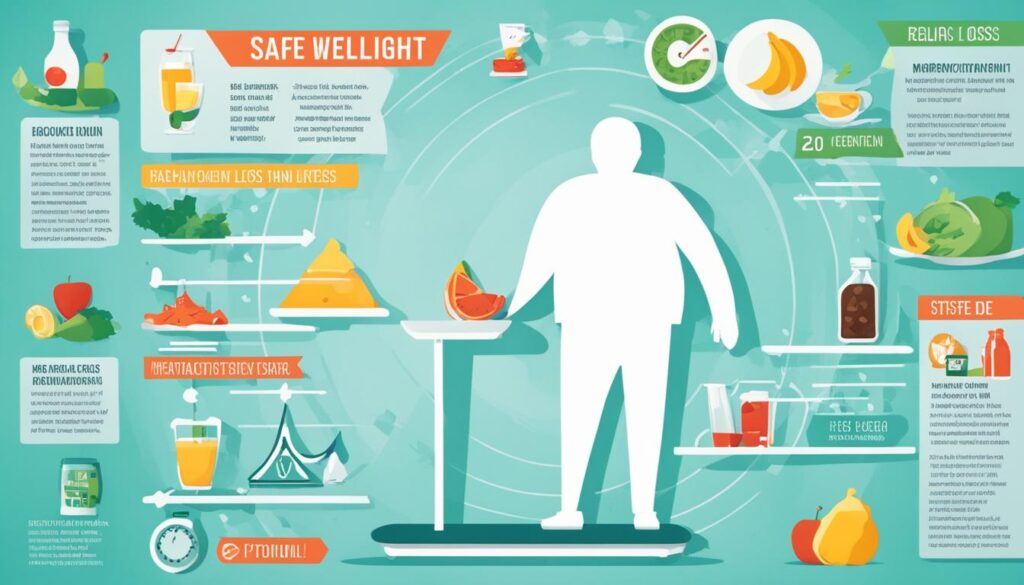Obesity is a growing problem in the United States, with one third of Americans now classified as obese. Safe weight loss is crucial for obese individuals to improve their overall health and reduce the risk of obesity-related diseases such as heart disease, diabetes, and certain types of cancer. In this article, I will explore effective strategies for safe weight loss, including proper nutrition, physical activity, and lifestyle changes. I will also discuss various obesity treatment options, such as medication and surgery, for those who need additional support in their weight loss journey.
Key Takeaways:
- Healthy weight loss is important for obese individuals to improve overall health and reduce the risk of obesity-related diseases.
- Effective weight loss strategies include proper nutrition, physical activity, and sustainable lifestyle changes.
- Proper nutrition involves creating a calorie deficit through a balanced diet and portion control.
- Physical activity is key for safe weight loss, improving fitness, metabolism, and mood.
- Making sustainable lifestyle changes, such as adopting healthier eating habits and managing stress, is essential for long-term weight loss success.
Understanding the Importance of Safe Weight Loss
Safe weight loss is not just about shedding pounds; it’s about improving overall health and well-being. When it comes to achieving effective and sustainable weight loss, it’s crucial to prioritize strategies that ensure long-term success and enable individuals to maintain a healthy weight. Obesity management involves more than just losing weight; it also requires making positive lifestyle changes that promote overall health and well-being.
One of the key reasons why safe weight loss is important is because it reduces the risk of obesity-related diseases such as heart disease, diabetes, and certain types of cancer. By losing weight in a safe and controlled manner, individuals can improve their overall health, enhance their quality of life, and increase their lifespan.
Moreover, safe weight loss focuses on creating sustainable and healthy habits instead of resorting to extreme or fad diets that offer short-term results. By adopting a balanced approach to weight loss, individuals can maintain their progress over time and avoid the cycle of yo-yo dieting, which can have detrimental effects on both physical and mental health.
Safe weight loss also encompasses the concept of obesity management. Rather than solely focusing on the number on the scale, obesity management involves making positive lifestyle changes that go beyond weight loss. This includes adopting healthier eating habits, incorporating regular physical activity into daily routines, managing stress, and prioritizing adequate sleep. These lifestyle changes not only aid in weight loss but also contribute to overall well-being and help individuals maintain a healthier lifestyle in the long run.
“Safe weight loss is not just about shedding pounds; it’s about improving overall health and well-being.”
Understanding the importance of safe weight loss sets a strong foundation for individuals on their weight loss journey. By prioritizing their overall health and well-being, individuals can achieve their weight loss goals while maintaining long-term success.
The Role of Nutrition in Safe Weight Loss

Proper nutrition plays a crucial role in safe weight loss for obese individuals. It is important to create a calorie deficit by consuming fewer calories than the body needs, while still providing essential nutrients. A balanced diet that includes fruits, vegetables, lean proteins, whole grains, and healthy fats is essential for safe and effective weight loss. Proper portion control, mindful eating, and regular meal planning can also contribute to successful weight loss.
Achieving safe weight loss requires a focus on proper nutrition. By selecting nutrient-dense foods and controlling calorie intake, individuals can create a calorie deficit that promotes weight loss while ensuring they receive the necessary vitamins, minerals, and macronutrients to support overall health.
- Fruits and vegetables: Incorporate a variety of colorful fruits and vegetables into your diet. They are rich in fiber, vitamins, and minerals, while being low in calories. Aim to fill half your plate with fruits and vegetables at each meal.
- Lean proteins: Choose lean sources of protein such as poultry, fish, tofu, and legumes. Protein helps promote satiety and muscle maintenance during weight loss.
- Whole grains: Opt for whole grains like brown rice, quinoa, and whole wheat bread instead of refined grains. Whole grains provide more fiber and nutrients, keeping you fuller for longer.
- Healthy fats: Include sources of healthy fats like avocados, nuts, and olive oil in your diet. These fats not only add flavor but also provide essential fatty acids that are important for overall health.
Portion control is another important aspect of safe weight loss. While eating nutrient-dense foods is essential, it’s also necessary to be mindful of portion sizes to avoid overeating. Using smaller plates and bowls, measuring portions, and practicing mindful eating can help control portion sizes and prevent excessive calorie intake.
Proper nutrition is the foundation of safe weight loss. By focusing on a balanced diet that includes a variety of nutrient-dense foods, individuals can promote weight loss while ensuring they receive the necessary nutrition for overall health.
In addition to proper nutrition, regular meal planning can contribute to successful weight loss. By preparing meals in advance, individuals can make healthier choices, control portion sizes, and avoid relying on unhealthy convenience foods. Meal planning can also help individuals stay on track with their weight loss goals by preventing impulsive and unhealthy food choices.
Your weight loss journey begins in the kitchen. By adopting a balanced and nutritious diet that supports safe weight loss, you can achieve your goals and improve your overall health.
| Nutrient | Recommended Intake | Food Sources |
|---|---|---|
| Protein | 10-35% of daily calories | Chicken breast, fish, tofu, lentils |
| Fiber | 25-35 grams per day | Fruits, vegetables, whole grains, legumes |
| Healthy Fats | 20-35% of daily calories | Avocados, nuts, olive oil, fatty fish |
| Essential Vitamins and Minerals | Varies based on individual needs | Fruits, vegetables, lean proteins, whole grains |
Incorporating Physical Activity for Safe Weight Loss
Physical activity plays a crucial role in safe weight loss for obese individuals. Not only does regular exercise help burn calories, but it also improves overall fitness, increases metabolism, and enhances mood. To achieve sustainable and effective weight loss, it is essential to choose physical activities that are enjoyable and can be incorporated into your daily routine.
There are different types of exercises that can contribute to safe weight loss:
- Cardiovascular exercises: Engaging in activities that elevate your heart rate, such as walking, jogging, swimming, or cycling, can help burn calories and improve cardiovascular health.
- Strength training: Incorporating resistance exercises, such as lifting weights or using resistance bands, can help build lean muscle mass and increase your metabolism, leading to more effective weight loss.
- Flexibility exercises: Including stretching and flexibility exercises, such as yoga or Pilates, can improve joint mobility and prevent injuries during physical activity.
The key is to find activities that you enjoy and can sustain in the long run. This increases adherence and helps you maintain a consistent exercise routine, maximizing the benefits of physical activity for weight loss. It’s important to start slowly and gradually increase the intensity and duration of your workouts to avoid overexertion or injuries.
Remember, incorporating physical activity into your daily life is not only beneficial for weight loss but also for overall health and well-being. It’s recommended to aim for at least 150 minutes of moderate-intensity aerobic activity or 75 minutes of vigorous-intensity aerobic activity, along with two or more days of strength training exercises, per week.
Physical activity combined with a balanced diet and other lifestyle changes can significantly contribute to safe weight loss and obesity management. It’s important to consult with a healthcare professional or a certified fitness trainer to create an exercise plan that suits your individual needs and abilities.
Physical activity is a crucial component of safe weight loss for obese individuals. Incorporating enjoyable and sustainable exercises, such as cardiovascular exercises, strength training, and flexibility exercises, can contribute to effective and long-lasting weight loss results. Remember to start slowly, gradually increase the intensity, and consult with professionals to ensure a safe and tailored exercise routine.
Making Lifestyle Changes for Safe Weight Loss

When it comes to achieving safe weight loss and managing obesity, making sustainable lifestyle changes is essential. These changes not only promote overall health and well-being but also contribute to long-term weight loss success.
One of the key lifestyle changes that can positively impact weight loss is adopting healthier eating habits. This includes cooking at home, which allows you to have better control over the ingredients and portion sizes of your meals. By reducing processed foods and limiting sugary beverages, you can prioritize nutritious options that will support your weight loss journey.
Managing stress and getting enough sleep are also crucial lifestyle changes for safe and effective weight loss. Stress can often lead to emotional eating or turning to unhealthy food choices, so finding healthy ways to manage stress, such as through exercise or relaxation techniques, can help prevent this. Additionally, adequate sleep is important for regulating hormones that impact hunger and fullness, making it easier to stick to a healthy eating plan.
“Adopting healthier eating habits, managing stress, and getting enough sleep are crucial lifestyle changes for safe and effective weight loss.”
Developing strategies to overcome emotional eating is another important aspect of lifestyle changes for weight loss. Emotional eating can sabotage your efforts by leading to consuming excessive calories. By identifying triggers and finding alternative coping mechanisms, such as engaging in a hobby or talking to a friend, you can overcome emotional eating and stay on track with your weight loss goals.
Making gradual and sustainable changes to your lifestyle is key to long-term weight loss success. It’s important to remember that small changes add up over time and can lead to significant results. By prioritizing healthy eating habits, managing stress and sleep, and overcoming emotional eating, you can create a solid foundation for safe weight loss and obesity management (check out my post on healthy eating habits here).
The Role of Physical Activity
Physical activity is another crucial lifestyle change that complements proper nutrition in safe weight loss and obesity management. Incorporating regular exercise into your routine helps burn calories, boost metabolism, and improve overall fitness.
Cardiovascular exercises, such as brisk walking, jogging, or cycling, help increase heart rate and burn calories. Strength training exercises, like weightlifting or bodyweight exercises, help build lean muscle mass, which in turn increases metabolism. Additionally, flexibility exercises, such as yoga or Pilates, help improve range of motion and overall body mobility.
By finding activities that you enjoy and are sustainable, you are more likely to stick to your exercise routine and achieve long-term weight loss results. Aim for at least 150 minutes of moderate-intensity aerobic activity or 75 minutes of vigorous-intensity activity per week, along with strength training exercises twice a week.
| Healthy Eating Habits for Weight Loss | Physical Activity for Weight Loss |
|---|---|
| 1. Cook at home and prioritize nutritious options | 1. Find enjoyable activities for cardio exercise |
| 2. Reduce processed foods and limit sugary beverages | 2. Incorporate strength training exercises to build muscle |
| 3. Practice portion control and mindful eating | 3. Include flexibility exercises for improved mobility |
| 4. Gradually eliminate unhealthy food choices | 4. Aim for at least 150 minutes of moderate-intensity aerobic activity or 75 minutes of vigorous-intensity activity per week |
Making these lifestyle changes for safe weight loss is not always easy, but the effort is worth it. By embracing healthier eating habits, managing stress, getting adequate sleep, overcoming emotional eating, and incorporating regular physical activity, you can achieve your weight loss goals and maintain a healthy lifestyle in the long run.
Understanding Obesity Treatment Options

While diet and exercise are the foundation of safe weight loss for obese individuals, there are cases where additional support through obesity treatment options is necessary. These options may include medication, such as prescription weight loss medications, or surgical interventions like bariatric surgery. When considering these treatment options, it is crucial for individuals to consult with a healthcare professional to determine the best course of action based on their specific needs and goals.
The Role of Medication in Obesity Treatment
Medication can be a valuable tool in obesity treatment, particularly for individuals who have not achieved the desired results through diet and exercise alone. Prescription weight loss medications can help suppress appetite, increase metabolism, or inhibit the absorption of fat in the body. It is important to note that medication should always be used under the guidance and supervision of a qualified healthcare professional.
The Potential Benefits and Risks of Bariatric Surgery
Bariatric surgery is a surgical procedure performed on individuals with severe obesity to aid in weight loss. This procedure may involve reducing the size of the stomach or bypassing a portion of the small intestine to limit food intake and absorption. Bariatric surgery can lead to significant weight loss and improvement in obesity-related health conditions. However, it is crucial to understand that surgical interventions carry risks, and the decision to undergo bariatric surgery should be made after careful consideration and consultation with a specialist.
“Obesity treatment options, such as medication and surgical interventions, can provide additional support to individuals struggling with obesity, but they should always be considered in conjunction with lifestyle changes, proper nutrition, and regular physical activity.”
It is essential to keep in mind that obesity treatment options should never be seen as a standalone solution. They should always be considered in conjunction with lifestyle changes, proper nutrition, and regular physical activity. These treatment options are most effective when used as part of a comprehensive and multidisciplinary approach to obesity management.
The Importance of Medical Supervision in Safe Weight Loss

When embarking on a weight loss journey, seeking medical supervision is crucial, especially for obese individuals. The guidance and support of a healthcare professional can make a significant difference in achieving safe and successful weight loss.
Medical supervision provides personalized care and monitoring throughout the weight loss process. A healthcare professional can assess your individual needs, create a tailored plan, and adjust it as necessary to ensure optimal results. They can also track your progress, offer guidance and support, and address any concerns along the way.
For those considering medication or surgical interventions, medical supervision is even more important. These options require careful monitoring and management to ensure their safety and effectiveness. A healthcare professional can guide you through the decision-making process, explain the benefits and potential risks, and help you make an informed choice that aligns with your overall health goals.
“Medical supervision plays a vital role in safe weight loss. With a healthcare professional by your side, you can navigate through the challenges, receive appropriate interventions if needed, and achieve sustainable results.”
By having a healthcare professional involved, you can have peace of mind knowing that your weight loss journey is being monitored and managed in a safe and effective manner. Their expertise and experience will provide you with the necessary tools and resources needed to overcome obstacles and achieve your weight loss goals.
Remember, embarking on a weight loss journey is not a solo endeavor. Seek the support and guidance of a healthcare professional to ensure that you are on the right track to safe and successful weight loss.
The Benefits of Medical Supervision in Safe Weight Loss
1. Personalized guidance: A healthcare professional can create a tailored weight loss plan based on your individual needs and preferences.
2. Ongoing support: You will have someone to turn to for guidance, motivation, and accountability throughout your weight loss journey.
3. Monitoring and adjustments: Your progress will be regularly monitored, and your plan will be adjusted as necessary to ensure optimal results.
4. Safety and effectiveness: With medical supervision, you can be confident that your weight loss efforts are being carried out in a safe and effective manner.
5. Access to additional interventions: If needed, a healthcare professional can provide you with access to medication or surgical interventions that can support your weight loss goals.
Evidence-Based Strategies for Safe Weight Loss

When it comes to safe weight loss for obese individuals, it’s essential to rely on evidence-based strategies that have been proven effective. By incorporating these strategies into your weight loss plan, you can increase your chances of success and achieve your goals. Let’s explore some of these evidence-based strategies:
1. Creating a Calorie Deficit
Creating a calorie deficit is a fundamental aspect of safe weight loss. This means consuming fewer calories than your body needs to maintain its current weight. One effective way to achieve this is by following a balanced and calorie-controlled diet.
2. Balancing Proper Nutrition
Achieving safe weight loss doesn’t mean compromising on proper nutrition. It’s important to focus on consuming a variety of nutrient-dense foods, including fruits, vegetables, lean proteins, whole grains, and healthy fats. This ensures that your body receives the necessary nutrients while still maintaining a calorie deficit.
3. Incorporating Regular Physical Activity
Physical activity plays a crucial role in safe weight loss. Engaging in regular exercise not only helps burn calories but also improves overall fitness and boosts metabolism. Aim for at least 150 minutes of moderate-intensity aerobic activity or 75 minutes of vigorous-intensity activity per week, along with strength training exercises.
4. Making Sustainable Lifestyle Changes
Safe weight loss is not just about short-term results; it’s about making sustainable lifestyle changes. This includes adopting healthy habits that you can maintain in the long run. Consider implementing strategies such as setting realistic goals, keeping a food diary, seeking social or medical support, and developing a support network to help you stay motivated.
5. Behavior and Lifestyle Modifications
Behavior and lifestyle modifications are essential for long-term weight loss success. By identifying and addressing any unhealthy behaviors or triggers, you can develop strategies to overcome them. This may involve managing stress, improving sleep quality, and finding alternative ways to cope with emotional eating.
“Safe weight loss is not just about shedding pounds; it’s about improving overall health and well-being for a sustainable and healthier future.”
Remember, achieving safe weight loss requires a comprehensive and personalized approach. Consulting with a healthcare professional or registered dietitian can provide valuable guidance and support throughout your journey.
| Evidence-Based Strategies for Safe Weight Loss |
|---|
| 1. Create a calorie deficit through a balanced and calorie-controlled diet. |
| 2. Focus on proper nutrition while maintaining a calorie deficit. |
| 3. Incorporate regular physical activity into your routine. |
| 4. Make sustainable lifestyle changes for long-term success. |
| 5. Implement behavior and lifestyle modifications to overcome challenges. |
The Importance of Goal Setting in Safe Weight Loss
Goal setting is a crucial component of safe weight loss for obese individuals. When embarking on a weight loss journey, it’s important to set realistic and achievable goals that provide a sense of direction and motivation. By setting clear targets, you can track your progress and make the necessary adjustments along the way. Let’s dive deeper into the significance of goal setting in safe weight loss strategies for obese individuals.
The SMART Approach to Goal Setting
When setting goals for safe weight loss, it’s helpful to follow the SMART approach, which stands for Specific, Measurable, Attainable, Relevant, and Time-bound. By creating goals that meet these criteria, you can set yourself up for success.
Specific: Specify what you want to achieve. Instead of saying “I want to lose weight,” be specific by stating “I want to lose 10 pounds.”
Measurable: Set goals that can be measured and tracked. For example, instead of saying “I want to exercise more,” set a goal of “I want to exercise for 30 minutes, four times a week.”
Attainable: Make sure your goals are realistic and achievable. Setting unrealistic expectations can lead to disappointment and frustration. It’s important to set goals that you believe you can accomplish.
Relevant: Your goals should be relevant to your overall weight loss journey. Align your goals with your long-term aspirations and values.
Time-bound: Set a specific timeframe for achieving your goals. This adds a sense of urgency and helps you stay focused. For example, “I want to lose 10 pounds in the next three months.”
Tracking Progress and Making Adjustments
Regularly tracking your progress is essential for staying on track with your weight loss goals. Keep a journal or use a tracking app to record your food intake, exercise routines, and any other relevant data. This will allow you to identify patterns, make informed decisions, and celebrate the milestones you achieve along the way.
Additionally, be open to making adjustments to your goals as needed. Weight loss journeys are unique to each individual, and what works for one person may not work for another. If you find that a particular goal is too challenging or not yielding the desired results, reassess and modify it accordingly. It’s important to take a flexible approach and listen to your body’s needs.
On the Path to Success
Goal setting is an integral part of safe weight loss strategies for obese individuals. By setting realistic, measurable, and time-bound goals, you can stay motivated, track your progress, and make the necessary adjustments along the way. Remember, your weight loss journey is a personal one, and it’s important to tailor your goals to your specific needs and circumstances. Stay focused, stay determined, and celebrate every step you take towards achieving a healthier, happier you.
Overcoming Challenges and Plateaus in Safe Weight Loss

Safe weight loss can be a challenging journey, often accompanied by plateaus that can feel discouraging. It is important to understand that weight loss is not always a linear process and setbacks can happen along the way. However, with the right strategies and mindset, these challenges and plateaus can be overcome.
The Power of Support
Seeking support from healthcare professionals or joining support groups can provide valuable guidance and motivation during your weight loss journey. Connecting with others who are going through similar experiences can help you stay focused on your goals and exchange valuable tips and insights.
Reassess and Adjust
When facing challenges or encountering plateaus, it may be necessary to reassess your weight loss strategies. Take a step back and evaluate what is and isn’t working for you. Are there any areas where you can make improvements or adjustments? By being open to change and willing to try different approaches, you can keep your weight loss progress moving forward.
Focus on Non-Scale Victories
While the number on the scale is one way to measure progress, it’s important to remember that weight loss encompasses more than just pounds lost. Non-scale victories, such as increased energy, improved stamina, or fitting into smaller clothing sizes, can be powerful motivators. Celebrate these achievements and use them to stay motivated on your journey.
Embrace Overall Health Improvements
Weight loss is not just about shedding pounds; it is also about improving your overall health and well-being. Take note of the positive changes you are experiencing, such as improved blood pressure, better sleep, or reduced joint pain. By focusing on these health benefits, you can stay inspired to continue your safe weight loss journey.
| Challenge | Solution |
|---|---|
| Lack of Motivation | Set small achievable goals, find an exercise or activity you enjoy, and seek support from friends and family. |
| Emotional Eating | Develop coping mechanisms for stress and emotional triggers, practice mindful eating, and seek therapy if needed. |
| Slow Progress or Plateaus | Reevaluate your diet and exercise routine, try new workouts or techniques, and focus on non-scale victories. |
| Lack of Time | Prioritize your health, schedule exercise like any other important appointment, and find time-saving meal prep strategies. |
By incorporating these strategies into your weight loss journey, you can overcome challenges and plateaus, reaching your goals and achieving safe and sustainable weight loss.
What is the Safest Approach to Weight Loss for Obese Individuals?
For obese individuals, a personalized obesity diet strategy is the safest approach to weight loss. By working with a healthcare professional to create a plan tailored to their specific needs and lifestyle, they can achieve sustainable results while minimizing potential health risks associated with rapid or extreme weight loss methods.
Celebrating Successes and Maintaining Weight Loss

Reaching your weight loss goals is an incredible achievement that deserves celebration. Celebrating your successes along the weight loss journey not only provides a sense of accomplishment but also helps maintain motivation for long-term success. Whether it’s fitting into a smaller size or reaching a milestone on the scale, acknowledging and celebrating these achievements can be incredibly inspiring.
“Success is not the key to happiness. Happiness is the key to success. If you love what you are doing, you will be successful.” – Albert Schweitzer
As you celebrate your accomplishments, it’s important to remember that weight maintenance is equally significant. Maintaining weight loss requires continued commitment to healthy habits and lifestyle changes. This includes making smart food choices, staying active, and prioritizing self-care.
The Power of Healthy Habits
By continuing the healthy habits you developed during your weight loss journey, you can sustain your progress and prevent weight regain. Focus on incorporating nutrient-rich foods, like fruits, vegetables, lean proteins, and whole grains, into your meals. These foods provide essential nutrients while keeping you satisfied.
Maintaining weight loss also requires monitoring your portion sizes and practicing mindful eating. Listening to your body’s hunger and fullness cues can help you avoid overeating and promote a healthy relationship with food.
Monitoring Progress and Seeking Support
Regularly tracking your progress can be a valuable tool in maintaining weight loss. Keeping a food diary or using a tracking app can help you stay accountable to your goals and identify any patterns or areas for improvement.
Additionally, seeking ongoing support is crucial in maintaining weight loss. Surround yourself with a supportive community, whether it’s friends, family, or a weight loss support group. Having people who understand and encourage your journey can make a significant difference in your long-term success.
Stay Committed to Your Well-being
Maintaining weight loss is about more than just a number on the scale. It’s about prioritizing your overall health and well-being. Focus on engaging in regular physical activity that you enjoy to stay active and boost your mood. Whether it’s walking, jogging, dancing, or practicing yoga, find activities that bring you joy and make them a part of your regular routine.
Remember to value your mental and emotional well-being as well. Managing stress, getting enough sleep, and practicing self-care are all essential components of a healthy lifestyle.
By celebrating your successes, maintaining healthy habits, monitoring progress, and seeking ongoing support, you can enjoy long-term success in your weight loss journey. Embrace the progress you’ve made and continue to prioritize your health and well-being every step of the way.
Conclusion
Achieving safe weight loss for obese individuals requires a comprehensive approach that addresses proper nutrition, physical activity, and sustainable lifestyle changes. Each person’s weight loss journey is unique, but by focusing on evidence-based strategies, seeking medical supervision, and setting realistic goals, success can be achieved. It is important to remember that safe weight loss goes beyond just shedding pounds; it is about improving overall health and well-being for a sustainable and healthier future.
Proper nutrition plays a crucial role in safe weight loss. The key is to create a calorie deficit by consuming a balanced diet that includes fruits, vegetables, lean proteins, whole grains, and healthy fats. Portion control, mindful eating, and regular meal planning are also essential for successful weight loss strategies.
Incorporating physical activity is equally important in safe weight loss for obese individuals. Regular exercise not only helps burn calories but also improves overall fitness, boosts metabolism, and enhances mood. Cardiovascular exercises, strength training, and flexibility exercises can all contribute to safe and effective weight loss.
Furthermore, making sustainable lifestyle changes is vital in achieving long-term success. This may involve adopting healthier eating habits, managing stress, getting enough sleep, and developing strategies to overcome emotional eating. Gradual and sustainable changes to one’s lifestyle are key to maintaining a healthy weight.




